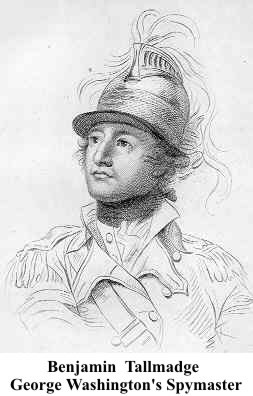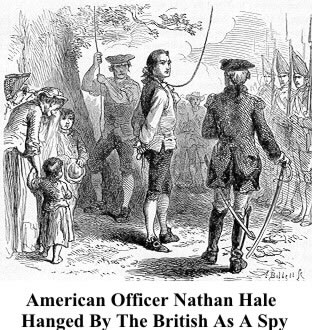George Washington - Master of Misinformation
By Ruluff D. McIntyre Governor, Ohio Society, The Order of the Founders and Patriots of America The misinformation machine created by George Washington was critical to the winning of the Revolutionary War. It became clear in 1776 that the American army was no match for the British in direct confrontation. So Washington quite early in the war adopted a strategy of delayed confrontation hoping ultimately to lure the British into battle where the situation favored an American victory.
After assuming command in Cambridge, Washington found that only thirty-six barrels of powder remained after Bunker Hill. That was only enough for nine rounds per man. Realizing the disastrous result of a British attack with the munitions so low, Washington sent messengers into Boston with the story that he had eighteen hundred barrels, and this same rumor was circulated in the American camp. Thus, a British attack was temporarily stalled. The Continental Congress had expressly forbidden the burning of New York. However, Washington sent members of Captain Nathan Hale's regiment into New York to start fires which ultimately destroyed 493 homes, or approximately one-third of the city. Unfortunately the British reaction to the conflagrations raised alertness, and Captain Nathan Hale, a spy sent by Washington to report on British fortifications, was captured and hung. One of Nathan Hale's best friends, Maj. Benjamin Tallmadge later became Washington's second-in-command in charge of setting up a spy network critical to the final victory.
Trenton
In December of 1776 things were desperate. Washington needed a spy to cross the Delaware to gain information about Col. Johann Rall's German troops in Trenton. No one would risk hanging for Continental Congress money so Robert Morris, the financier of the Revolution, obtained 410 Spanish dollars, 2 English crowns, 10 shillings, and 2 sixpence from Philadelphia to pay a former British soldier, John Honeyman, to spy on Rall's troops. Honeyman gained the confidence of Rall and found out detailed information on the routine of the Trenton soldiers, the location of picket guards, and other information necessary to a successful assault. He also convinced Rall the American troops were lacking in food, clothing and other basic equipment necessary for a Winter march. Honeyman's misinformation was the reason Rall felt comfortable about the traditional drinking and feasting that usually went with Christmas and so was totally unprepared for the December 26, 1776 attack of Washington's Continentals.
On December 22, 1776 Honeyman got himself captured by an American patrol which took him immediately to Washington's headquarters. After obtaining the information about Rall's encampment, Honeyman was thrown into the guardhouse from which he escaped with the help of a key provided by Washington. He supposedly ran away through a hail of bullets, designed to miss, and went back to Trenton on December 24 where he conveyed his misinformation to Rall who delighted in the prospect of a safe Christmas celebration without worry of war. Subsequently, Rall was killed and his troops routed in the successful American attack made possible by misinformation.
Yorktown
Ever wonder why Sir Henry Clinton kept his troops in New York instead of helping Comwallis in Yorktown? Again, the Washington misinformation machine! The British commander, Clinton, had decided to attack the recently arrived French army before it could become entrenched. Accordingly, Clinton mustered six thousand troops and sailed to Huntington Bay off the north side of Long Island. An American spy, Robert Townsend, code name Culper, Jr., reported the British movement of troops. The misinformation machine quickly generated a "top secret" detailed plan stating that Washington would attack New York with every available soldier in the middle states. An American double agent in New York let the plan fall into British hands claiming it was captured from a courier. When Clinton heard about the plan, not knowing it was a fake, he immediately returned to New York and stayed there awaiting the American assault that never came.
When Washington's army marched south through New Jersey to join the French at Yorktown, Benedict Arnold wanted to attack the long column with six thousand British troops. However, British spies were led to believe the Americans were building large cooking ovens at several locations around New York providing evidence of an anticipated attack on New York. Clinton decided to keep every available man in New York. By the time he realized Washington's plan to join the French for an attack on Charles Lord Cornwallis at Yorktown, it was too late to send reinforcements. Washington's misinformation machine had maneuvered the British army into a battle the Americans could win. And they did! As is well known, the British defeat at Yorktown rewarded Washington's delayed confrontation strategy with final victory.
Ears to the Keyhole
There were other heroes of the spy network who should be mentioned. In 1777 the British occupied Philadelphia. One of Washington's assistants, Maj. John Clark, became very proficient at allowing muster lists written by Washington to fall into the hands of British spies. These lists magnified the strength of the American army at Valley Forge four or five times. General Howe, commander of the British troops, recognized Washington's handwriting so he accepted the numbers as authentic.
Lydia Darragh was a Quaker born in Ireland who was both a midwife and undertaker in philadelphia. The British occupied a room in her house which they used to discuss war plans. Lydia could overhear the British conversation from an adjoining room. She concealed written notes about the discussions in large, cloth covered buttons sewn to the clothing of her 14-year old son. Her son would meet his brother, a lieutenant in the American anny, who would remove the buttons and convey the information to Washington. For instance, Lydia warned Washington of the British intention to attack his army as it marched to Valley Forge in December, 1777. Because of her warning, the Continentals were ready with musket and cannon to drive the British forces away, thus preventing a disaster.
In June of 1780 the British knew how weak the American army was at the Morristown camp. There were only four thousand men and no horses because of a fodder shortage. Without horses, the artillery could not be moved. The British occupied Charleston, South Carolina, having captured five thousand Americans. The South was in a state of panic. The British thought they could administer a "coup de grace" by attacking Washington's weak army a Morristown. Six thousand troops were mobilized on Staten Island for the attack. Just hours before the planned attack, an American spy reached the American officer in command at Elizabethtown, Col. Elias Dayton, who warned Washington at Morristown. Dayton with his New Jersey Continental Line assisted by local militia harassed the British advance and delayed it for almost a full day. The delay gave Washington time to seize the higher areas of the Short Hills to thwart the British assault. Without the warning, the British would almost certainly have overwhelmed the four thousand Americans at Morristown, capturing the artillery and ending the war. Washington's spy network, set up by Tallmadge, achieved another victory! Washington's spies were so deceptive in their spreading of disinformation about dwindling American strength that they were often arrested by American officials. For instance, in 1780 three of Washington's agents were arrested and brought before Gov. William Livingston of New Jersey to be hung for communicating with the enemy! An arranged escape got them back to work for three more years.
Hero with a Purpose

The capture and execution of Capt. Nathan Hale deserves additional attention because of the nature of the man and the significance of his sacrifice. Hale was educated at Yale College and served as a schoolmaster before joining the Continental army. After George Washington took command of the army in 1776, he was desperate to know more about British fortifications in New York. In spite of the worth to the military effort, spies were generally viewed as distasteful human beings lacking in honor and despicable in character. It was felt that no gentleman could accept such an assignment. So when Washington asked his aide, Col. Knowlton, to obtain a volunteer from his group of officers for a special mission as a spy, it was little wonder that no one volunteered. Knowlton revealed Washington's feeling of desperation and the importance of the information to the survival of the Continental army. Again he asked the officers, and again there was silence. Finally, Hale reluctantly agreed to accept the task. His fellow officers attempted to dissuade him, telling him he had no experience in such matters and such a task would be against his nature. However, Hale insisted the importance of the mission to Washington made any sacrifice acceptable, and he was capable of performing the task. When Knowlton told Washington of Hale's decision, Washington attempted to dissuade Hale, also. However, the need for the information was urgent.
Hale was affable and handsome. His intellect and charm made communication with British officers and Loyalists easy. Hale soon accumulated details regarding British military strength and fortifications which he wrote on scraps of paper in Latin to be hidden in his shoes. He was on his way back to American lines when he decided to stop at a tavern called The Cedars which was operated by Mrs. Chichester, referred to as "Mother Chick" by the local patrons, British soldiers and Loyalists. Unfortunately, a Tory relative of Hale recognized him as a rebel sympathizer and informed the British aboard a ship in harbor called The Halifax commanded by Captain Quarme. Hale was captured and the notes in his shoes discovered. As indicated earlier, New York had been set on fire by soldiers of Hale's regiment on September 21, 1776, the same day Hale was captured. The British were in a bad mood. Quarme questioned Hale who admitted he was a spy. There was no choice. Hale was sent to General Howe to be sentenced to death by hanging. General Howe was so impressed with Hale that he offered him clemency if Hale would join the British. Hale refused. He was turned over to a brutal Provost Marshal named William Cunningham who was well known for his cruel treatment of American prisoners. A 10 o'clock on the morning of September 22, 1776, Hale was publicly hung after saying the words that will forever enshrine his memory, "I only regret that I have but one life to lose for my country." Hale's untimely death inspired his best friend, Maj. Benjamin Tallmadge, to set up the spy network so critical to the final victory.
